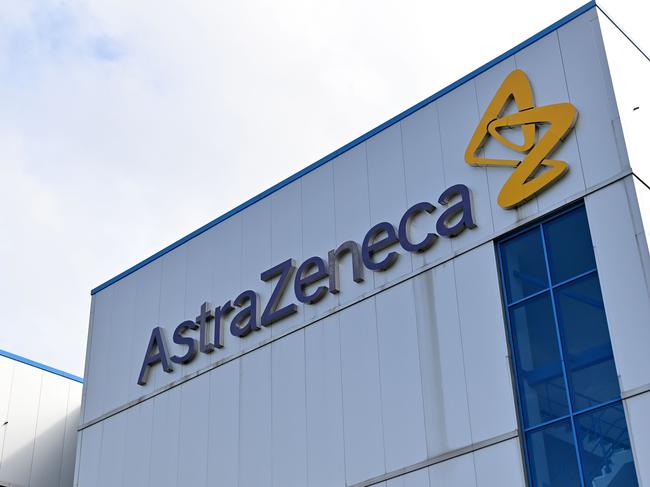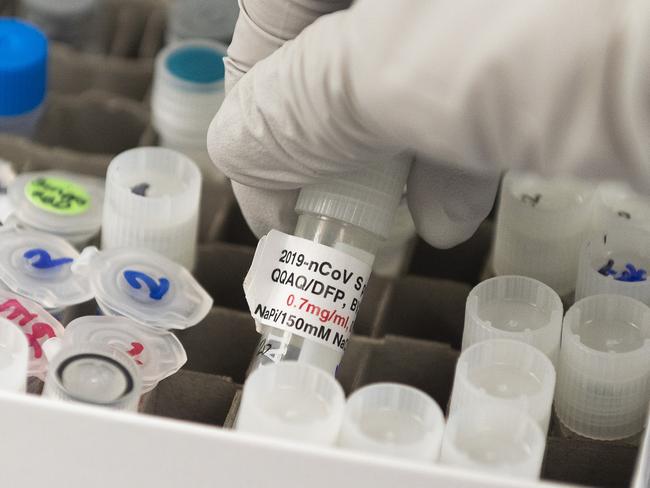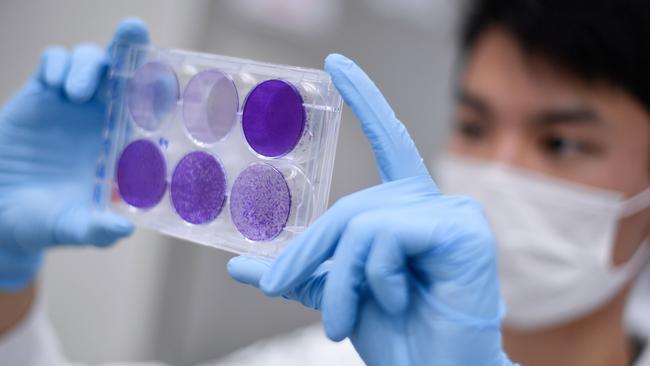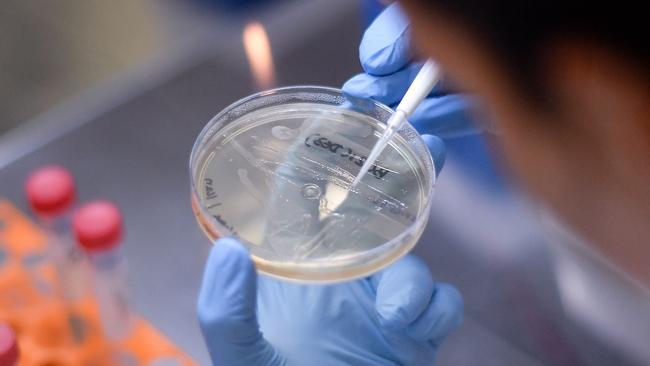Coronavirus: Oxford vaccine could be available by year end despite clinical trial pause
The pharma giant behind the Oxford COVID-19 vaccine says a treatment could still be available by year end despite pausing a clinical trial.
Drugs giant AstraZeneca says a COVID-19 vaccine could still be available by as early as the year end, despite a randomised clinical trial being paused.
“We could still have a vaccine by the end of this year, early next year,” the UK-based company’s chief executive Pascal Soriot said in comments at a media event.
AstraZeneca announced Wednesday it had “voluntarily paused” its trial of a vaccine developed alongside Oxford University after a UK volunteer developed an unexplained illness.
An independent committee was drafted in to review safety but the company said it was a “routine action” designed to maintain the integrity of the trials.
“We will be guided by this committee as to when the trials could restart, so that we can continue our work at the earliest opportunity,” Soriot said in a statement.

AstraZeneca’s vaccine candidate is one of nine around the world currently in late-stage Phase 3 human trials.
In the US, the company began enrolling 30,000 volunteers across dozens of sites on August 31, and smaller groups are being tested in Brazil and elsewhere in South America.
The vaccine, called AZD1222, uses a weakened version of a common cold-causing adenovirus engineered to code for the spike protein that the novel coronavirus uses to invade cells.
After vaccination, this protein is produced inside the human body, which primes the immune system to attack the coronavirus if the person is later infected.
The World Health Organization (WHO) said the development was “a good wake-up call... that there are ups and down in research”.
“We don’t need to be overly discouraged because these things happen,” WHO chief scientist Soumya Swaminathan told a virtual press conference.

The director of UK scientific research charity the Wellcome Trust, Jeremy Farrar, said there were often pauses in vaccine trials.
He told BBC radio in an interview that it demonstrated the importance of conducting vaccine trials properly, with independent oversight and the involvement of the regulator.
“In the end the public must have absolute trust that these vaccines are safe and of course effective, and in the end will hopefully bring the pandemic to a close,” he added.
Britain’s chief scientific adviser, Patrick Vallance, on Wednesday said similar events should be expected but progress on vaccines and therapeutics was positive overall.
“Some will read out this year in terms of efficacy and safety,” he told a Downing Street news conference.
“And I think there’s a reasonable chance that... we can think about the possibility of vaccination next year sometime at larger levels.” UK Health Secretary Matt Hancock said the pause was “not necessarily” a setback, and said a similar pause occurred recently but was “resolved without a problem”.
COVID-19 VACCINE: YOUR QUESTIONS ANSWERED
We have no natural immunity to COVID-19 and the only way of containing the deadly pandemic is through social distancing, wearing masks and handwashing and this is devastating the world economy.
If we could develop a vaccine it’s likely we could return to normal life.
Normally it takes up to 10 years to produce a vaccine but scientists are working overtime to produce a COVID-19 jab in just one year.
Here’s everything you need to know about the race for a COVID-19 vaccine.
WHAT IS A VACCINE?
Vaccines train the body’s immune system to recognise a virus or germ and stop it spreading in the body and making you sick.
HOW DOES A VACCINE WORK?
Normally when you catch a virus the immune system creates a memory of that virus so it can fight it off next time. A vaccine presents a small fragment of the virus to the immune system so it creates that memory but it doesn’t make you sick.
WHAT TYPES OF VACCINES ARE BEING DEVELOPED FOR COVID-19?
In the past scientists obtained a virus and weakened or inactivated it to create vaccines. Now they are using the virus’ genetic sequence to synthesise vaccines. COVID-19 uses a spike protein to attach to receptors on people’s cells, allowing the virus to enter the body and replicate. A vaccine that can block these spike proteins could prevent infection.
HOW IS THE COVID-19 VACCINE BEING FAST-TRACKED?
Normally it can take up to a decade to produce a safe vaccine because of the extensive testing needed to prove it can prevent infection and does not harm people who receive it.
Pharmaceutical companies, regulators and manufacturers are working together to fast-track approvals for clinical trials.
Research teams are signing early contracts with global pharmaceutical companies.
Companies are manufacturing millions of doses of vaccines before they are even proven to work so if they do stack up they can be distributed immediately.
There is a risk this investment will be lost if the vaccines don’t work.

HOW MUCH MONEY IS INVOLVED IN VACCINE TRIALS?
Money is just as important as the science in developing a vaccine.
Large-scale human trials cost hundreds of millions of dollars to run and it costs billions to manufacture bulk quantities of vaccine.
Normally companies wait until a vaccine candidate is successful in an animal trial before they invest in human trials and large-scale human trials are only commenced if smaller trials work, but this time human trials are taking place while animal trials are still being completed.
Governments have supplied billions of dollars to finance vaccine research and production.
The international body – the Coalition for Epidemic Preparedness Innovations, or CEPI – is also spending millions on a variety of COVID-19 vaccines in the hope at least one will work.
WHICH COUNTRIES HAVE DEALS FOR VACCINE SUPPLY?
Australia will spend $1.7 billion to secure access to 34 million doses of the University Oxford/AstraZeneca vaccine and has ordered a further 50 million doses of the University of Queensland vaccine, both will be produced locally by manufacturer CSL.
The Oxford University vaccine team also has a deal with pharmaceutical giant AstraZeneca to make 30 million doses for the UK, 300 million doses for the US and an Indian manufacturing plant will make one billion doses for countries elsewhere in the world.
WILL WEALTHIER COUNTRIES GET BETTER ACCESS TO ANY VACCINE?
There is concern about so-called vaccine nationalism where wealthy countries snap up large supplies of COVID-19 vaccines leaving poorer countries without access.
The COVAX global vaccines facility is a program designed to pool funds from wealthier countries and non-profits to develop a COVID-19 vaccine and distribute it equitably around the world.
Its aim is to deliver two billion doses of effective, approved COVID-19 vaccines by the end of 2021.
HOW DO CLINICAL TRIALS WORK?
Normally vaccines have to go through a lengthy five stage clinical trial process.
The first stage involves preclinical testing in animals to discover whether the vaccine produces antibodies, check if it protects against illness.
Phase I clinical trials test the vaccine in a small number of humans to make sure it is safe.
Phase II clinical trials test it in a larger number of humans to determine if it actually works to produce antibodies to the virus.
Phase III clinical trials test the vaccine in tens of thousands of people to determine if it prevents people getting infected with the virus.
Phase IV clinical trials occur after the vaccine has been rolled out and check it long term to ensure it doesn’t have side effects.
During the COVID-19 pandemic, some of the trials have been collapsed into Phase 1/2 or Phase 2/3 trials to shave months off the process.
In these trials half the volunteers are injected with the vaccine, the other half receive a placebo — another type of vaccine that is already proven safe — so researchers can compare whether people who received the vaccine are less likely to be infected than those given the placebo.

WHAT REGULATORY HURDLES ARE THERE?
Before they can be used, vaccines must be approved by Australia’s medicines watchdog the Therapeutic Good Administration (TGA).
The US equivalent the Food and Drug Administration has said vaccines will need to prevent infections or reduce the severity of COVID-19 in 50 per cent of recipients before they will be approved.
WHAT ARE THE FRONTRUNNER VACCINES?
There are over 165 vaccines under development around the world.
The leading vaccine candidate is being developed by the University of Oxford and AstraZeneca it is already in large scale phase 2/3 human clinical trials in tens of thousands of people and millions of doses have already been manufactured but the trial was halted this week after a participant became ill.
To date, just one coronavirus vaccine has been approved for use – Russia’s Sputnik V — however it has not yet been through phase 3 testing to prove it works to prevent coronavirus.
On June 25, the Chinese military approved the vaccine as a “specially needed drug” for soldiers
Novavax, the University Queensland, Serum Institute of India, Moderna, Pfizer and its partner BioNTech, Clover Pharmaceuticals and Innovio also have vaccines in phase 1 or 2 clinical trials.
Many of these early phase clinical trials are being conducted in Australia because we have low cases of the virus.
WHAT SAFEGUARDS ARE IN PLACE?
Almost the entire population will be injected with the COVID-19 vaccines so it is vital they are proven safe.
Unlike a life- saving medicine where the risks may outweigh the benefits a COVID-19 vaccine will be given to healthy people so it can’t make them sick.
Last time scientists tried to make a vaccine against SARS in 2003 animals who caught the virus despite being vaccinated got a worse form of the illness.
In 1976 when a novel swine flu epidemic swept the US the hasty rollout of a vaccine saw around 450 people develop Guillain-Barre syndrome, a rare neurological disorder, after getting the shot.
A dengue vaccine was found safe in clinical trials, but some people developed Antibody Dependent Enhancement (ADE) a condition where the person develops a more severe immune related illness if they have already been exposed to the virus used in the vaccine.
Some children developed a rare bowel disorder in reaction to the first rotavirus vaccine.
WILL YOU NEED MORE THAN ONE DOSE?
It is likely you will need more than one dose of the vaccine to achieve protection from the virus, many of the vaccines in development require two doses several weeks apart.
It is unclear how long the vaccines will protect you from infection, you may need a yearly jab as for the flu.
If the virus mutates scientists will have to reformulate the vaccines to provide proper protection.
WILL IT PREVENT ALL INFECTIONS?
The flu vaccine is only 60 per cent effective in preventing the flu virus, sometimes you still get a milder version of the flu even if you’ve been vaccinated and it is possible the COVID-19 vaccine won’t be 100 per cent effective.
Older people have weaker immune systems so the vaccine may have to be constructed differently to protect them.
WHO WILL GET THE VACCINE FIRST?
Frontline medical workers like doctors and nurses and the elderly will get the first doses of the vaccine under rules laid down in the government’s pandemic plan.
The vaccine will be free to all Australians, it won’t be compulsory and the government hopes to start vaccinating people from early next year if a successful vaccine emerges.
